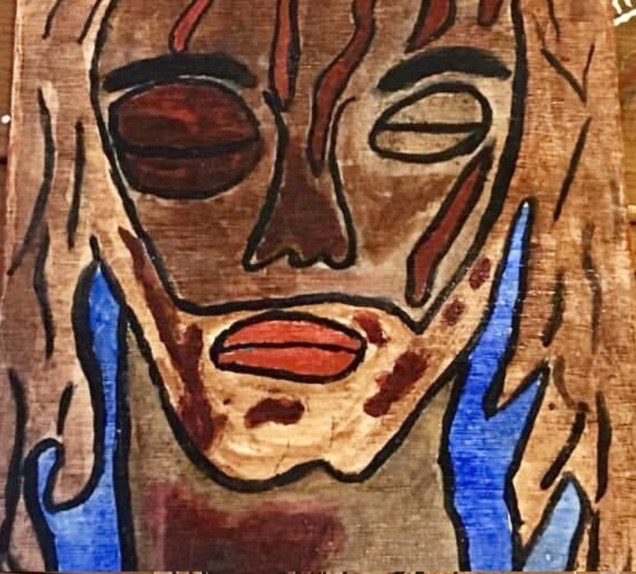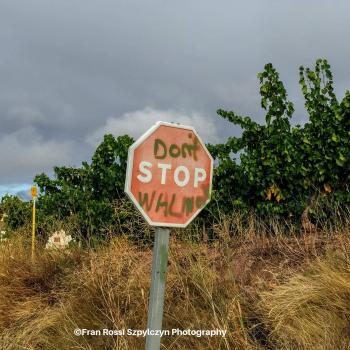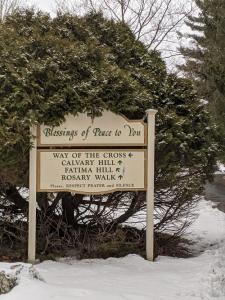
I looked around at my fellow Confirmands, most of them hiding zits with heavy doses of foundation cream. Others wore too much makeup, perfume or cologne. The boys checked out the girls in their bright colored dresses and the girls looked at the boys who probably wore the first suit they had ever worn in their lives, other than the cheap tuxes a couple might have worn as ring bearers in relatives’ weddings.
Being confirmed with junior high kids didn’t bother me. But, it made me realize I knew no one at the church other than my sponsor, and I didn’t even know him very well. We’d been acquaintances through various churches in Columbus, Ohio, but didn’t hang out that much. When I couldn’t find anyone else, I asked him to stand with me and he graciously agreed.
As I processed up the aisle to receive the oil of Chrism, I thought about why no one joined me for this huge transition in my life. My marriage was about to end. Most of my old Protestant friends didn’t talk to me anymore. No one would take me out for a beer afterward. In other words, my entrance into the church didn’t come with joy and celebration. It came with an intense period of spiritual suffering that I’m still sorting through.
For awhile, I thought that I was alone in my faith journey. I believed that I bravely made a courageous step forward even though “none went with me.” The reality is, I didn’t grasp the full meaning of my Confirmation. Instead of rejoicing that I’d been brought into the family of God, I doubled down on my own spiritual pain and focused on licking my wounds.
Spiritual suffering can lock us into our own heads and hearts like nothing else. If you’ve ever gone through your soul being wrecked, your faith ripped up like cheap clothes or your heart for Jesus torn out of your chest, you know what I mean. We can and often do lock ourselves into internal dungeons that we never want to leave. In my first year in South Bend, I often found myself sitting my living room, even on bright sunny days, just staring at the T.V., not remembering anything I watched.
Usually, when spiritually inclined people experience normal suffering, they turn to God for comfort and peace. But, spiritual pain is so much worse because God and all that spirituality stuff is the main source of the problem. Going to mass (or church) or praying seems like making contact with the very last Being you want talk to in the universe. And we often believe that we are alone and must bear it alone. If we tell someone, they might be shocked and appalled. We let all of that stop us from reaching out for help, afraid it won’t be there.
The reality is, all of us suffer spiritually. And spiritual suffering is the one kind of pain we actually can share with one another. Sharing someone’s physical pain is almost impossible. Every time my kids get sick or hurt, I want it to be me. I want to bear their suffering and pain. But I can’t.
However, that is not the case with spiritual suffering. We can literally bear one another’s burdens, as Jesus commands. St Paul even goes so far as to say in Colossians that his suffering for the church fills up what is lacking in Christ’s suffering. A strange comment, but if you consider his teaching that we are all a part of the Body of Christ and the Eucharist itself, it makes sense.
The Protestant writer and theologian Charles Williams believed we really could take on a person’s suffering, if we chose to do so in our own free will. His letters are filled with requests for other people to take on someone’s suffering for awhile. At first, this seems like a strange, even crazy, idea. But, he points out that if we are truly joined in the Body of Christ, who suffered for us, we can participate in suffering for others.
Indeed, the idea of Purgatory, prayers for the dead and other substitutionary Catholic teachings are founded on the belief that we are connected to each other in very real and substantial ways.
As I wrote in my Halloween piece, Christ’s death and resurrection unites us all in the Eucharist. And, that means we are a community, not in a superficial “book club” way, but in a deep, profound and marriage bed sort of way. Yes, this does seem strange, but that is the level of intimacy described. This means we’re all bound together – everyone from cool Catholic hipsters to right and left wing Catholics, little old ladies, white men, black men, gays, women, and anyone I might have missed in that litany of sinners.
Most of the time, we’re focused on correcting each other. In the debates of this election season, we’ve seen very little burden bearing. Instead, we see accusations, finger pointing and lack of mercy. And, no one, including myself, has been immune.
We need to practice our connectedness in concrete, profound ways. We often ask people if we can pray for them. Do we ask them if we can suffer for them? For example, if a person is suffering anxiety about his marriage, what if we actually say, “I’ll take your anxiety for awhile. When you’re tempted to be anxious, just remember I’m being anxious for you.”
Yes, it does seem crazy and strange. But, it also fights against the idea we are alone in our faith or that we die alone. There is nothing glorious or noble about it. If we are Christians, we’re part of a huge, dysfunctional family brought together by the Father’s love. We also have people who are called to suffer with us.
A few years ago, I went to mass on the Samson Cree reservation in Alberta, Canada. The mass was led by a Filipino priest in broken English and he spoke the Our Father in Cree. I looked around at my First Nation Brothers and sisters. I seemed to see their whole history full of pain and suffering, some of it brought on by the very church they attended through the Catholic Church’s participation in the forced reeducation of First Nation children. But, the Church repented and got down on its knees to suffer with those who hurt. Through the pain and suffering, redemption is coming. They filled up what was lacking in Christ’s suffering.
The Church must do a better job at entering into people’s spiritual suffering. I’m not talking about starting grand, spectacular programs. We’ve got enough of those. Just ask a friend, family member or parish member: How can I suffer for you today?
So, for the election, instead of throwing and slinging mud, let’s ask each other, “how can I bear your suffering and fear today?”












